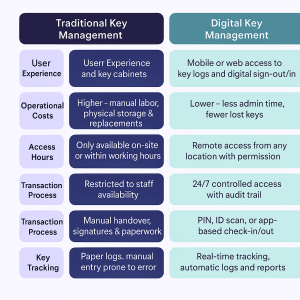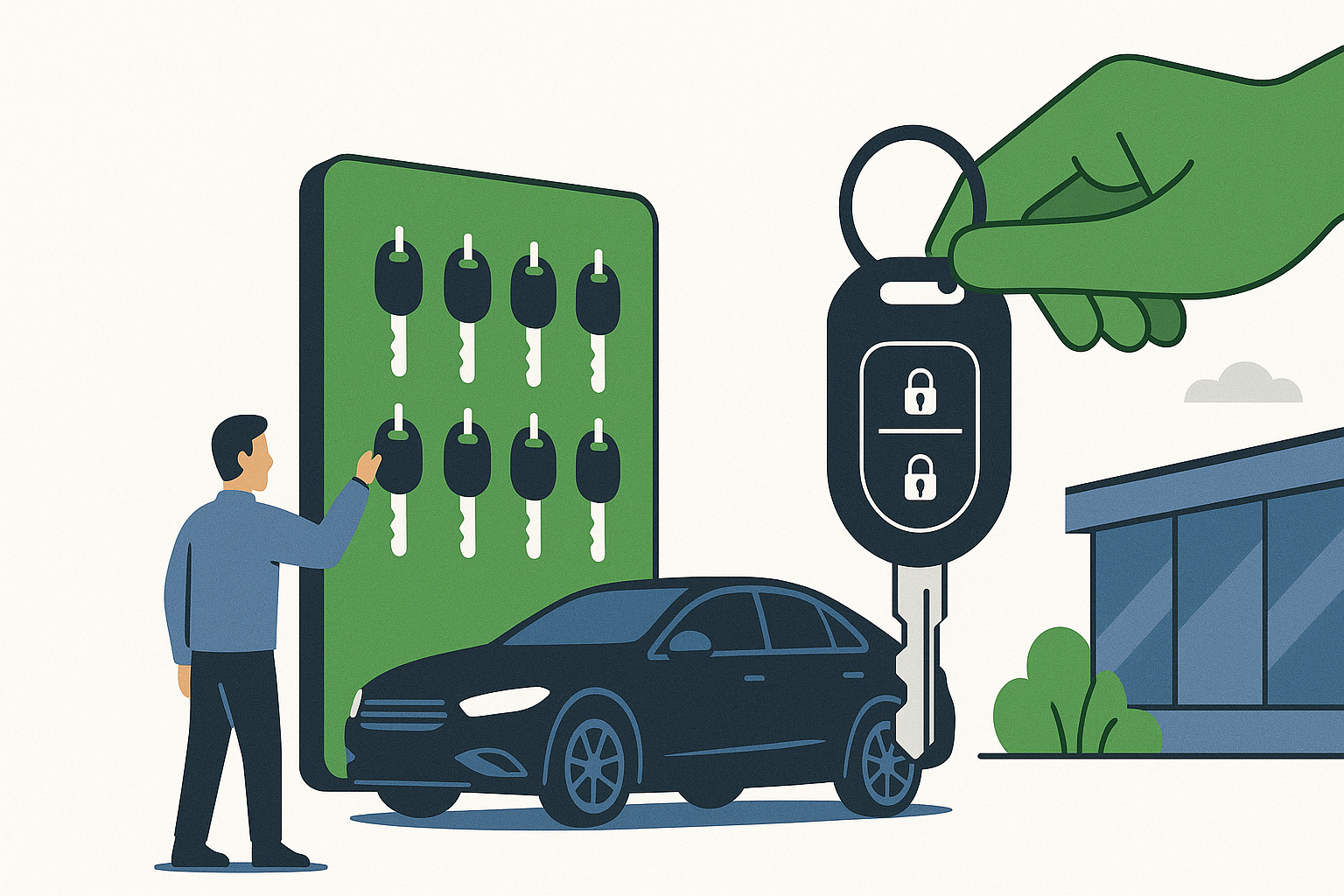In the automotive industry, dealerships are navigating a complex landscape where traditional key management meets cutting-edge digital solutions. The crucial question of traditional key management vs. digital key management systems remains a critical decision for car dealerships and automotive service centers.
Today, in this comprehensive guide, we will bridge the divide by exploring both approaches’ key differences, advantages, and disadvantages.
Table of Contents
What is Traditional Key Management?
Traditional key management refers to the manual handling and tracking of vehicle keys in car dealerships through physical key boards, logbooks, and manual processes. It involves direct human oversight and tangible key tracking methods.
Here are some main characteristics of Traditional Key Management:
- Physical Key Boards:Requires physical key boards and storage systems, creating a tangible key tracking experience.
- Manual Oversight:Allows direct human oversight of key handoffs between staff and customers, fostering personalised service.
- Limited Geographical Reach:Customers are restricted to the store’s location, limiting the potential market size.
- Fixed Access Hours:Bound by dealership operating hours, potentially hindering after-hours vehicle access needs.
Advantages of Traditional Key Management
- Personal Oversight:Allows for direct staff interaction and accountability in key handoffs.
- Immediate Key Access:Staff can access vehicle keys immediately when needed for test drives or service appointments.
- Physical Security:Physical key control systems can provide visible security measures for vehicle inventory.
Disadvantages of Traditional Key Management
- High Administrative Costs:Manual key tracking, lost key replacement, and dedicated staff time can be significant financial burdens.
- Limited Visibility:Manual tracking systems restrict real-time key location visibility and accountability.
- Operational Inefficiencies:Manual processes can lead to lost keys, delays, and poor accountability.
What is Digital Key Management?
Digital key management, or electronic key management, refers to tracking and controlling vehicle keys through digital platforms and smart technology. It leverages QR codes, RFID tags, and mobile applications to streamline automotive key control processes.
Some key characteristics of Digital Key Management:
- Digital Tracking:Operates through mobile applications and cloud-based systems, providing real-time key location data from anywhere with an internet connection.
- Multi-Location Support:The ability to manage keys across multiple dealership locations, significantly expanding operational control.
- 24/7 Monitoring:Provides continuous key tracking, allowing dealership staff to monitor vehicle keys around the clock.
- Automated Workflows:Utilises QR codes and RFID technology to streamline key handoffs, reduce administrative costs, and increase operational efficiency.
Advantages of Digital Key Management
- Enhanced Visibility:Can track keys across multiple locations and departments, boosting operational control and accountability.
- Cost-Effective:Lower administrative costs than manual systems, reducing lost key replacement expenses and staff time.
- Accessibility:Enables dealership staff to access key information anytime, anywhere, improving operational efficiency.
- Audit Trail:Provides valuable key tracking data and detailed logs for accountability, compliance reporting, and operational analysis.
Disadvantages of Digital Key Management
- Technology Dependencies:Reliance on internet connectivity and device functionality requires backup systems and technical support.
- Initial Setup Costs:Implementation of digital systems requires upfront investment in hardware, software, and staff training.
- Learning Curve:Staff adaptation to new digital processes may initially slow operations until full system adoption.
Traditional vs. Digital Key Management

Future Trends in Automotive Key Management
The future of automotive key management is likely to be a hybrid model that merges the strengths of both traditional and digital approaches. Here are some emerging trends in car dealership key control:
- Smart Key Tags:Advanced RFID and Bluetooth-enabled key tags offer real-time location tracking and automated alerts for enhanced vehicle security.
- Multi-Department Integration:Seamlessly connecting sales, service, and parts departments provides unified key control across all dealership operations.
- AI and Automation:Digital key management systems will leverage artificial intelligence for predictive analytics and automated key retrieval processes.
- Augmented Reality (AR):AR will allow dealership staff to quickly locate keys through augmented reality interfaces, enhancing operational efficiency. According to industry reports, the global market for automotive key management systems is expected to grow significantly as dealerships modernize their operations.
- Blockchain Technology: According to automotive technology experts, blockchain technology offers significant potential for key management systems, enhancing security and creating tamper-proof audit trails for vehicle access control.
FAQ on the Difference between Traditional and Digital Key Management
What is the difference between traditional key management and ecommerce?
In many car dealerships, key management still relies on wall hooks, logbooks, or someone’s memory — which leads to lost keys, wasted time, and awkward handovers. A digital key management system changes everything. With smart cabinets and app-based access, sales staff and technicians can instantly access the right keys while managers get real-time visibility over every handover. You know exactly who took the key, for which car, and when it was returned. It keeps test drives smooth, improves accountability, and stops the “who had the keys last?” chaos for good.
Can a dealership integrate both traditional and digital key management?
Yes, dealerships can integrate both approaches to leverage their strengths. This hybrid strategy can enhance operational efficiency while maintaining physical security measures.
How can I improve my ecommerce website’s SEO?
To improve your ecommerce website’s SEO, focus on using targeted keywords, creating quality content, optimising your site for mobile devices, and ensuring fast loading times.
What are some key strategies for success in ecommerce?
Successful ecommerce strategies include:
- SEO optimisation.
- Social media marketing.
- User-friendly website design.
- Utilising data analytics to understand customer behaviour.
Can you provide an example to differentiate between traditional commerce and ecommerce?
In traditional commerce, an example would be purchasing groceries at a local supermarket, where customers physically visit the store, select items from shelves, and make purchases at the checkout counter. In contrast, ecommerce involves buying clothing online from an ecommerce website, where customers browse through product listings, add items to their virtual cart, and complete the purchase through digital online transactions.
Conclusion
Both traditional and digital key management systems have their unique strengths and challenges. While traditional key management offers physical security and direct oversight, digital systems provide real-time tracking, automated workflows, and comprehensive audit trails. Car dealerships must evaluate their operational needs and resources to determine the most suitable approach or consider integrating both to maximize their efficiency.
By understanding these differences and implementing effective key management strategies, car dealerships can improve operational efficiency and enhance vehicle security. Whether you choose the reliability of traditional key control or the advanced capabilities of digital systems, the key lies in ensuring proper vehicle access control and staff accountability.
Keyzi Key Management Software simplifies the process by providing a comprehensive platform designed explicitly for automotive dealerships. Cost-effective compared to manual systems, Keyzi empowers you to establish robust key control with built-in features for QR code tracking, RFID integration, and automated reminders. The platform’s user-friendly design ensures a smooth experience for dealership staff and customers. Whether you’re a seasoned wholesaler looking to streamline your online operations or have just started, JustSell Wholesale Ecommerce equips you with the tools and resources to thrive in the ecommerce landscape.


